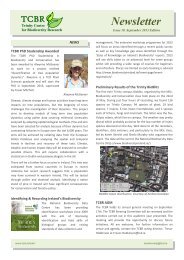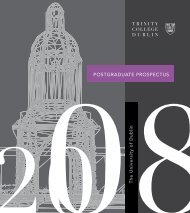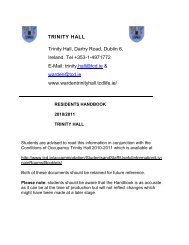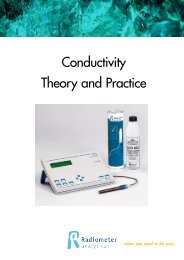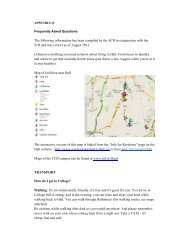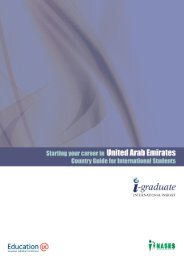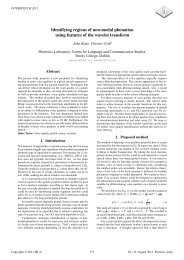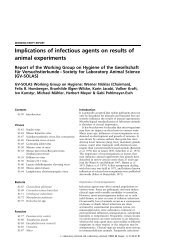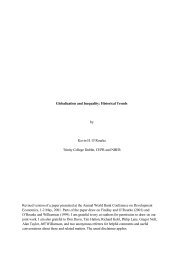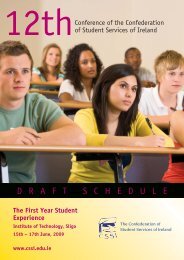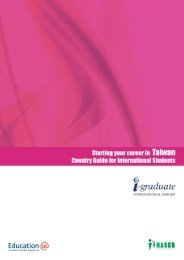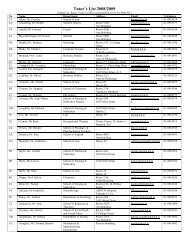Conference Programme (PDF, 1019KB) - Trinity College Dublin
Conference Programme (PDF, 1019KB) - Trinity College Dublin
Conference Programme (PDF, 1019KB) - Trinity College Dublin
Create successful ePaper yourself
Turn your PDF publications into a flip-book with our unique Google optimized e-Paper software.
abstracts by stream and session<br />
Secondly, data show that the school staff’s representations influence the identity construction of the migrants’ children. It seems that the<br />
representation of the educational institution influences ethnic identification. However, for avoiding a deterministic perspective, the results<br />
show that these teenagers are active subjects in the construction of their own identity. They compose it by combining ethnic, gendered,<br />
class and young subculture identity components.<br />
Finally, it is unveiled that the educational institution, although it defines itself as multicultural and open to the incorporation of<br />
differences, continues to stigmatize the children of migrants through culturalist practices. In practice, it continues to consider good<br />
integration as assimilation into the national culture.<br />
The Influence of the Body in Migrant and Indigenous Boys’ Interactions within the Masculine Hierarchy of the School<br />
Lindsey Garret, <strong>Trinity</strong> <strong>College</strong> <strong>Dublin</strong>, Ireland<br />
This paper analysis data from the large <strong>Trinity</strong> Immigration ‘Learning Together Project’ to explore the impact of the body in the<br />
development of positive and negative relationships between migrant and indigenous boys within the child world of the school. The ‘body’<br />
refers both to the presentation of self through one’s appearance such as height, weight, clothing, ‘racialised’ characteristics such as skin<br />
colour and physical competence/incompetence in sport and games. Thus, the active and passive functions of the body will be analysed<br />
as bearers of social value and status within the child world of the school; spaces in which the children’s attention is primarily directed at<br />
their peers instead of teachers or other authority figures. This paper seeks to highlight the need to understand integration beyond formal<br />
skill attainment such as English language proficiency and emphasises the importance of understanding integration as a lived social<br />
relation. For this purpose a Bourdieuian phenomenology of social space will be drawn upon to illuminate the impact of embodiment<br />
agency in childhood which simultaneously influences and is shaped by micro peer exchanges and macro concepts of gender, race and<br />
immigration.<br />
SESSION 4e The Children and Families of Polish and Russian Immigrants<br />
Polish migrants and their children in London: encountering schools<br />
*Louise Ryan, Middlesex University, UK<br />
Alessio D'Angelo, Middlesex University, UK<br />
Magdalena Lopez- Rodriguez, Middlesex University, UK<br />
Poland’s accession to the EU in May 2004 brought many new possibilities and opportunities for Polish migrants to Britain. In the<br />
period from May 2004 to June 2008, over 500,000 Poles registered with the Workers Registration Scheme as employees in Britain.<br />
One unforeseen consequence of this rapid increase in migration was the large numbers of Polish children arriving in British schools.<br />
According to office government statistics, there are over 26,000 school pupils in England whose first language is Polish (DCFS, Schools<br />
Census, 2008).<br />
Schools are not only places of education but also sites of socialisation and interaction. Social norms, values and expectations are taught<br />
and learned through both the formal and informal curriculum – in the classroom, playground and at the school gates (Adams and Kirova,<br />
2006).<br />
For newly arrived migrant children and their parents school may be the place where they encounter the diversity of the host society<br />
in all its complexity and newness. While school may be regarded as a safe place of learning, it can also be daunting and confusing.<br />
Conversations at the school gates may provide parents with a valuable opportunity to acquire new information and make friends (Ryan,<br />
2007). However, school can also be associated with culture clashes, negative stereotypes, feelings of isolation and even racist bullying.<br />
Thus, for newly arrived migrant children and their parents, school provides an array of opportunities and challenges.<br />
In this paper we explore these issues drawing on our research with Polish migrants in London (Ryan et al, 2007; 2008) and on Polish<br />
children in London primary schools (Sales, et al, 2008). Based on interviews with parents and teachers at 4 London primary schools,<br />
as well as some additional data from Polish children, we explore processes of adaptation, accommodation, negotiation and identity<br />
formation. In addition, we also consider the ways in which Polish migrants construct notions of Polishness in the context of education.<br />
Children of Emigration: an exploratory study of the acculturation experience of Polish adolescents in Ireland<br />
Beata Sokolowska, <strong>Trinity</strong> <strong>College</strong> <strong>Dublin</strong>, Ireland<br />
The paper reports first findings from an exploratory study of the acculturation experience of Polish adolescents in Ireland. The objective of<br />
this study is to understand how Polish adolescent migrants develop ‘acculturation strategies’ of adjusting to their new situation and how<br />
this is reflected in the unfolding of their social relations at school and in the family. It endeavours to answer the following questions: how<br />
it is to be a Polish teenager in Ireland and how the language barrier and social expectations for smooth assimilation create distinctive<br />
conflicts for personal and identity development. Moreover, this project includes an exploration of the perception of acculturation from<br />
parents’ and teachers’ perspective.<br />
70



